The announcement this week that the United States is effectively pulling its longtime support for Yemeni President Ali Abdullah Saleh in favor of political transition in Yemen have spawned a fresh wave of reports about the threat of al-Qaida in the country. The country’s political tumult has prompted many Yemeni military troops to abandon their posts, while others have been summoned to the capital, according to the New York Times, which reports that the resulting power vacuum is being filled by al-Qaida in the Arabian Peninsula. The extent and true nature of the al-Qaida threat in Yemen, however, continue to […]
Diplomacy & Politics Archive
Free Newsletter
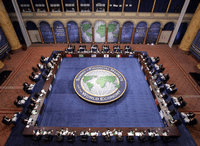
The notion that the underlying distribution of global power is shifting from West to East and from North to South is not new. For more than a decade, astute observers have noted that countries like China, Brazil and India, among others, were consistently posting impressive economic growth rates and closing the gap separating them from the advanced industrial economies. Yet, even as the reality of their economic rise was impossible to dispute, the structures of global financial governance did not adapt to reflect these changes. Of course, this is not surprising, as international institutions are notoriously resistant to reform. As […]
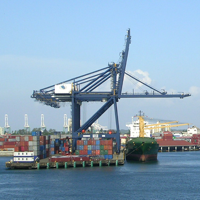
As recently as a decade ago, Latin America’s economic future looked dim, as highlighted by a number of events in December 2001. That month, Argentina’s economy crashed; amid massive street protests, four Argentine presidents resigned in less than two weeks, with one presiding just long enough to officially declare the largest sovereign debt default in history. Brazil and Uruguay reeled from their neighbor’s meltdown, while other countries in the region braced for capital flight by panicky investors. In addition to Argentina’s collapse, a looming threat from the East was the cause of further foreboding: On Dec. 10, 2001, the People’s […]
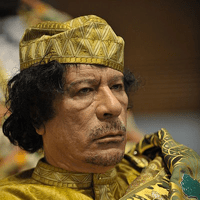
The ebb and flow of the Libyan civil war has led most American and European commentators to draw two conclusions. First, the conflict will end with a negotiated settlement. Second, international peacekeepers may be required to make any deal work. The case for a negotiated settlement is based on the simple fact that a military solution to the crisis is unlikely: The rebels probably cannot win on the battlefield, and Col. Moammar Gadhafi cannot be allowed to do so. A stalemate is also unappealing, not least because it would require the U.S. and Europeans to continue policing Libya’s airspace, at […]
Fierce fighting has turned Ivory Coast’s main city into a ghost town as a final showdown looms between presidential rivals. Inhabitants of Abidjan are terrified to leave their homes. The first evacuations of foreigners have begun. With peacekeepers in its former colony, France is helping secure the safety of its nationals.
In March, Raymond Davis, a CIA contractor who shot and killed two men rumored to be agents of Pakistan’s Inter-Services Intelligence (ISI) agency, was released in return for a $2 million payment to the victims’ families. In an email interview, Shaun Gregory, a professor at Bradford University and director of the Pakistan Security Research Unit there, discussed relations between the CIA and ISI. WPR: What are the main areas of cooperation — and mistrust — between the CIA and ISI? Shaun Gregory: The interests of the CIA and ISI most closely converge around the fight against al-Qaida as well as […]
Japan recently arrested a South Korean crab fisherman for operating illegally not far from group of islands claimed by both countries. In an email interview, Min Gyo Koo, an expert in East Asian island disputes at Seoul National University, discussed the territorial dispute between Japan and South Korea. WPR: Briefly, what is the history of the territorial dispute between Japan and South Korea? Min Gyo Koo: The disputed islands known as Dokdo in Korea and as Takeshima in Japan are de facto controlled by South Korea, but Japan does not recognize South Korea’s de jure sovereignty. Japan’s fundamental legal claim […]
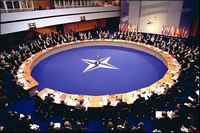
The commencement of military operations in Libya has led to some unexpected reactions in Eastern European capitals. It was widely expected that Russia, whose uneasiness with the very principle of humanitarian intervention is well-known, would have used its veto at the U.N. Security Council to block the passage of Resolution 1973. After all, Russia’s firm opposition to the Kosovo intervention in 1999 led the United States to work through NATO rather than bring the matter to the Security Council. And Moscow has had a clear track record over the last decade of resisting Western calls for intervention on humanitarian grounds […]
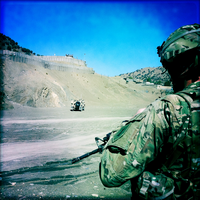
COMBAT OUTPOST BOWRI THANA, KHOST, Afghanistan – Since taking over this volatile district on the border with Pakistan earlier this year, Charlie Company of the U.S. Army’s 1st Battalion, 26th Infantry Regiment has come under a series of attacks from incoming rockets. One round hit just inside the small outpost, its shrapnel slicing off one soldier’s hand and leaving him with a hole in his thigh. Another, on a different day, scored another hit, throwing one lieutenant off his feet and sending him hurling through the air. “We took as many attacks — four — in a month as our […]
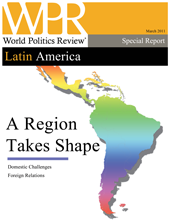
U.S. President Barack Obama’s decision to carry on with a trip to Latin America even as he was launching a military campaign in Libya is a testament to that region’s rising global profile. In Brazil, Peru and Colombia, pragmatic new leaders are attempting to lock in the domestic gains of their predecessors. Others are stumbling, with Mexico still seized by a bloody fight with drug trafficking and the leaders of Ecuador and Bolivia facing a loss of popular support. In this special report, World Politics Review examines the emerging shape of Latin America through articles published in the past six […]
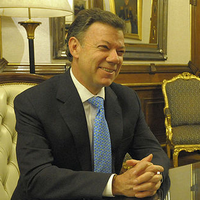
A number of recent overtures by Colombian President Juan Manuel Santos toward China have caused concern in Washington and put pressure on Congress to finally pass the free trade agreement (FTA) with Colombia. Although this is probably Santos’ intention, the highly publicized moves should actually be understood in the context of his broader efforts to diversify Colombia’s foreign policy posture. In September 2010, one month after his inauguration, Santos accepted $1 million in aid from China to be used to acquire Chinese logistical military equipment. The Chinese government also invited several senior military officers to participate in training courses in […]
